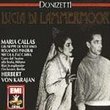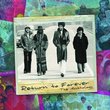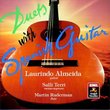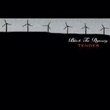| All Artists: Wagner, Edelmann, Schwarzkopf, Karajan Title: Wagner: Die Meistersinger Von Nürnberg Members Wishing: 0 Total Copies: 0 Label: Angel Records Release Date: 6/27/1990 Genre: Classical Styles: Opera & Classical Vocal, Historical Periods, Modern, 20th, & 21st Century Number of Discs: 1 SwapaCD Credits: 1 UPC: 077776350028 |
Search - Wagner, Edelmann, Schwarzkopf :: Wagner: Die Meistersinger Von Nürnberg
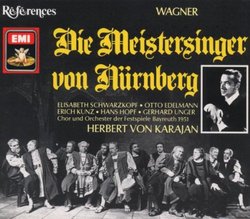 | Wagner, Edelmann, Schwarzkopf Wagner: Die Meistersinger Von Nürnberg Genre: Classical
After World War II, the allied powers contemplated suppression of all Wagnerian performance in Germany. However, wiser heads prevailed, and in 1951 the Festspielhaus at Bayreuth reopened under the management of Wagner's... more » |
Larger Image |
CD DetailsSynopsis
Amazon.com After World War II, the allied powers contemplated suppression of all Wagnerian performance in Germany. However, wiser heads prevailed, and in 1951 the Festspielhaus at Bayreuth reopened under the management of Wagner's grandsons. As noisy as a stage recording can be, with limited fidelity from the dawn of the LP era, this set still conveys the enthusiasm accompanying the newly reopened festival. Casting is uneven, but the recording retains interest for the connoisseur because of the energetic conducting of Herbert von Karajan, the ravishing performance of the young Elisabeth Schwarzkopf as Eva, and the authoritative resonant Sachs of Otto Edelman that shows the great tradition of the Bayreuth singers of the first part of the century. --Christian C. Rix Similar CDs
|
CD ReviewsKarajan conducts "Die Meistersinger" at the reborn Bayreuth L. E. Cantrell | Vancouver, British Columbia Canada | 02/06/2007 (5 out of 5 stars) "SOURCE: This is an assembled production built up by Walter Legge from portions of a rehearsal on July 27 and live performances in the Festspielhaus in Bayreuth on August 5, 16, 19, 21 and 24, 1951. It was originally issued by Columbia Records on 68 sides (34 disks) at 78 rpm, making it the largest production ever issued in that format. SOUND: This reocrding is one of producer Walter Legge's first attempts to crack the problem of recording the unique sound of Bayreuth. There are undoubtedly faults, as pointed out by prior reviewers. For those who insist on hearing the worst, it should be noted that the new tape recording technology of the era was not quite up to such a huge project as this one, so there are a few occasions of overloading, fade away and discernible joins. Nevertheless, the overall effect is not as bad as all this would seem to suggest. Considering that it is a first attempt, the mono sound is acceptable and capable of pleasing any listener who is more interested in the performance than the sound technology. CAST: Hans Sachs*, cobbler - Otto Edelmann Walther von Stolzing, knight - Hans Hopf Eva Pogner - Elisabeth Schwarzkopf Sixtus Beckmesser*, town clerk - Erich Kunz Veit Pogner*, goldsmith and Eva's father - Frederick Dalberg David, apprentice cobbler - Gerhard Unger Magdalena, Eva's nurse - Ira Malaniuk Fritz Kothner*, baker - Heinrich Pflanzl Kunz Vogelgesang*, furrier - Erich Majkut Konrad Nachtigall*, tinsmith - Hans Berg Balthasar Zorn*, pewterer - Josef Janko Ulrich Eisslinger*, grocer - Karl Mikorey Augustin Moser*, tailor - Gerhard Stolze Herrmann Ortel*, soap maker - Heinz Tandler Hans Schwarz*, stocking weaver - Heinz Borst Hans Foltz*, coppersmith - Arnold van Mill Nightwatchman - Werner Faulhaber. (* Member of the Guild of Master Singers) CONDUCTOR: Herbert von Karajan with the Bayreuth Festival Orchestra and Chorus. DOCUMENTATION: Libretto in German. COMMENTARY: The Bayreuth Festival was reborn from the catastrophe of the war years in 1951. Its former director, Winifred Wagner, the composer's British-born daughter-in-law and dear friend of Adolf Hitler, was still very much alive but she had been firmly removed from any authority at the Festival because of her loudly proclaimed political affiliations. Her sons Wieland and Wolfgang were in charge of the officially de-Nazified Festival and of its nearly empty treasury. It is a famous part of opera lore that the bothers coped with both problems by presenting semi-abstract productions with next-to-bare stages, few props and simple (not to mention cheap) costumes, all bathed in elaborate lighting plots. All those things were certainly true of the soon-to-come "Tristan und Isolde," as produced by Wieland Wagner. But Rudolf Hartmann's 1951 "Die Meistersinger von Nuernberg" was still very much a traditional production. Contemporary photographs show St. Katherine's Church in the first act to have been realistic and almost oppressively massive. Hans Sach's shop in the second act was set on stage right at the side of a broodingly authentic-looking Sixteenth Century cityscape. The interior of his house in the first part of act three was dimly-lit and gloomily realistic. Only the final set gave a hint of things to come, for Nuremberg was reduced to a bare stage with risers on each side and across the back, with what appear to be cut-outs of the skyline placed flat against a sky scrim. Costumes and props were resolutely realistic and clunky throughout. All that would change in the next "Meistersinger" production when Wieland got his hands on it ... but not yet. Less articulated in opera lore is the fact that the new production style was not terribly significant then and much less so now. What was important was that the post-war period was a time of immensely skilled older conductors (as well as that youngish whippersnapper Karajan) and brilliantly talented singers. Consider the cast list: Edelmann, Kunz, Unger, Malaniuk, Stolze, and yes, even Hopf are names to conjure with. And Schwarzkopf is pure magic. In the nature of things, the titanic egos of the Wagner brothers and Karajan led to conflicts. Not long after this recording was made, Karajan withdrew in the course of a feud over something or other, so the revival of the "Meistersinger" production in 1952 was led by Hans Knappertsbusch (who would feud with the brothers and depart in 1953.) The Knappertsbusch-led performance of "Die Meistersinger" of July 30, 1952 has also become available on CD, perhaps a little more happily recorded than this one. The cast is much the same, with the absence of Kunz, the substitution of della Casa for Schwarzkopf and the addition of brilliant newcomers Theo Adam and Gustav Neidlinger in small parts. The contrast of the two versions is enlightening. Knappertsbusch was the ultimate traditionalist, while Karajan was already beginning to reshape music in his own image. This is a famous--if artificially assembled--performance from a famous production. There are occasional rough spots, as is to be expected in a live performance. The overall performance is fine. Even Hopf, who had the voice and the strength to be great but not the understanding or the will, is bearable. In fact, he is noticeably better here under taskmaster Karajan than he would be in the following year under the less insistent Knappertsbusch. Schwarzkopf is wonderful. (Her only equal as Eva was the luminous but shamefully under-recorded Elisabeth Gruemmer.) Good performance, great conductor, stellar cast. It's not perfect, for no "Meistersinger" recording is ever likely to be, but it is certainly worth five stars. NOTE ON ANOTHER VERSION: This set set unavailable at the moment. As I write this, I see that Amazon UK has a perfectly acceptable version from Naxos, although without a libretto. That version, of course, is freely available here in Vancouver's classical record stores." A benchmark none have matched tjcolyer | 04/25/2002 (5 out of 5 stars) "Herbert vo Karajan's 1951 recording of Wagner's Die Meistersinger can be recommended without reservation. Even those with the most demanding needs for modern recording quality will recognise the benefit of sacrificing some of the finer points of sound quality for the greater immediacy, excitement and inspiration of this legendary performance. For those accustomed to Karajan's later recordings, what is surprising about this recording is the freedom with which the whole piece is played, with tempos and dynamics allowed a freer reign than in some of Karajan's later, and drier, work. The Bayreuth playing brings out the work's celebratory nature better than any recording since, and Karajan's conducting allows all involved to respond when the score calls for an increase in adrenalin levels. Walter's entry in Act 2 is a case in point. The singers give superb characterisations. Walter's impetuous and naiive romanticism is powerfully portrayed by the vibrany singing of Hans Hopf, whose spontaneous singing at the end of act one is quite magnificent. The central romance of the opera is further aided by the beautiful and at times poignant singing of Elizabeth Schwarzkopf, who's softer voice gives exactly the right level of innocence to the character. The highlight, though, is Edelmann's imperious Sachs. Unlike some since, Edelmann understand's that Sachs is not just an old man, but is also one who has an important element of mischief (at the end of acts one and two), and a compassion for the common person. More than this, Sachs is also a character with a strong German nationalism (however unpopular that might be, it is something Wagner was certainly not ashamed of) and a sadness that never touches on self-pity. No other portrayal of this complex character quite brings out all the elements of the character, as well as providing some wonderfully musically singing. All the smaller parts sing there parts well, especially the somewhat pathetic Kunz as Beckmesser, whose interaction with Edelmann adds a lot to the comic aspect of the story. Other recordings offer more control, more technical perfection (there are rare moments when mistakes are made, such as the opening chord of the overture), and improved sound quality. But none have matched the vibrancy, power, and characterisation that Karajan's early recording offers. A classic against which all other performances of this masterpiece must be judged, and against which all fall short." A Meistersinger to end all other Meistersingers! Ryan Kouroukis | Toronto, Ontario Canada | 10/21/2004 (5 out of 5 stars) "Karajan's live '51 recording under the direction of Walter Legge is truly a testament to Art herself.
Perfection and Excellence are the mottos of this historic performance. The intensity Karajan brings to the score is overwhelming..just listen to the overture for instance! The sound is in wonderful mono...better than Naxos's recent re-issue or that of Uarania. Unfortunately this set is discontinued from EMI, and only comes with the German libretto. Nevertheless, what is most interesting in hearing this set is the "dramatic through line" which is rarely captured on record, but is self-evident and vivid thanks to Karajan. A fantastic display piece is you ever find it used. You will fall in love with Meistersinger all over again listening to this recording." |

 Track Listings (16) - Disc #1
Track Listings (16) - Disc #1